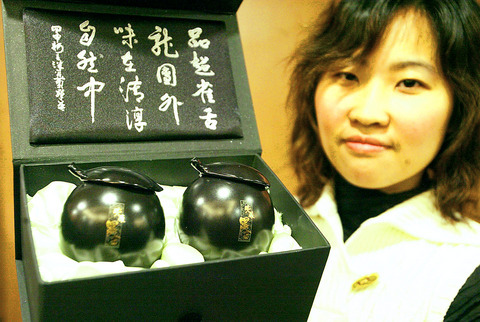Are you worried about how to throw a special Christmas or New Year's party? Make time to visit the upcoming food and beverage carnival at Taipei World Trade Center Exhibition Hall I this weekend for a glimpse of the wide array of products exhibited.
Co-organized by the nation's coffee, tea and wine associations, the four-day fair will take place starting this Friday and include more than 300 exhibitors hailing from 20 nations.

PHOTO: CNA
"We want to introduce Taiwan's best tea to consumers, especially when this year tea has been chosen as one of the main export products to enhance the nation's agricultural brand," said Hsu Fa-cheng (徐發政), secretary general of the Taiwan Tea Association (台灣製茶公會), at a press conference yesterday.
To put Taiwan on the map, the Council of Agriculture designated four products -- the Taiwan Tilapia fish, orchids, oolong tea and mangoes -- as the main focus of agricultural exports this year.
Lee Shen-chih (李勝治), chairman of Ten Ren Tea Co (天仁茶業) which runs the Cha for Tea (喫茶趣) restaurant chain here, said the company's booth will display the nation's champion tea it procured at a bidding held by the council early this month. The top tea produce was auctioned off at a record-breaking price of NT$460,000 (US$14,200) per 600g, Lee added.
Describing coffee as a demonstration of art and culture, the Taiwan Coffee Association (
"As Taiwan has evolved from a major coffee consumer to a producer, it is even more important to have exchanges with other nations," said Simon Hsing (邢治平), the association's chairman and executive director of the Central America Trade Office, citing the attendance of exhibitors from Ivory Coast as conducive to enhancing information exchanges.
In addition to product displays, the fair will also feature coffee-smelling competitions, tea-making performances by Taiwanese, Jap-anese and British experts, and instruction on differentiating between real and fake wine.
Entrance fees are NT$200 each for adults. Visitors can get a NT$100 discount ticket at 7-Eleven convenience stores in Taipei City and county.

WEAKER ACTIVITY: The sharpest deterioration was seen in the electronics and optical components sector, with the production index falling 13.2 points to 44.5 Taiwan’s manufacturing sector last month contracted for a second consecutive month, with the purchasing managers’ index (PMI) slipping to 48, reflecting ongoing caution over trade uncertainties, the Chung-Hua Institution for Economic Research (CIER, 中華經濟研究院) said yesterday. The decline reflects growing caution among companies amid uncertainty surrounding US tariffs, semiconductor duties and automotive import levies, and it is also likely linked to fading front-loading activity, CIER president Lien Hsien-ming (連賢明) said. “Some clients have started shifting orders to Southeast Asian countries where tariff regimes are already clear,” Lien told a news conference. Firms across the supply chain are also lowering stock levels to mitigate

Six Taiwanese companies, including contract chipmaker Taiwan Semiconductor Manufacturing Co (TSMC, 台積電), made the 2025 Fortune Global 500 list of the world’s largest firms by revenue. In a report published by New York-based Fortune magazine on Tuesday, Hon Hai Precision Industry Co (鴻海精密), also known as Foxconn Technology Group (富士康科技集團), ranked highest among Taiwanese firms, placing 28th with revenue of US$213.69 billion. Up 60 spots from last year, TSMC rose to No. 126 with US$90.16 billion in revenue, followed by Quanta Computer Inc (廣達) at 348th, Pegatron Corp (和碩) at 461st, CPC Corp, Taiwan (台灣中油) at 494th and Wistron Corp (緯創) at

NEGOTIATIONS: Semiconductors play an outsized role in Taiwan’s industrial and economic development and are a major driver of the Taiwan-US trade imbalance With US President Donald Trump threatening to impose tariffs on semiconductors, Taiwan is expected to face a significant challenge, as information and communications technology (ICT) products account for more than 70 percent of its exports to the US, Chung-Hua Institution for Economic Research (CIER, 中華經濟研究院) president Lien Hsien-ming (連賢明) said on Friday. Compared with other countries, semiconductors play a disproportionately large role in Taiwan’s industrial and economic development, Lien said. As the sixth-largest contributor to the US trade deficit, Taiwan recorded a US$73.9 billion trade surplus with the US last year — up from US$47.8 billion in 2023 — driven by strong

ASE Technology Holding Co (ASE, 日月光投控), the world’s biggest chip assembly and testing service provider, yesterday said it would boost equipment capital expenditure by up to 16 percent for this year to cope with strong customer demand for artificial intelligence (AI) applications. Aside from AI, a growing demand for semiconductors used in the automotive and industrial sectors is to drive ASE’s capacity next year, the Kaohsiung-based company said. “We do see the disparity between AI and other general sectors, and that pretty much aligns the scenario in the first half of this year,” ASE chief operating officer Tien Wu (吳田玉) told an